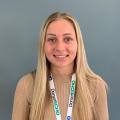PUPILS at a school in Corfe Mullen have been inspired by sustainable fashion experiments in a mobile lab.
Students at Lockyer’s Middle School, part of Initio Learning Trust, have taken part in three experiments based on sustainable fashion.
The year 5, 6 and 7 pupils took part in the science lessons in a Curiosity Cube - a mobile lab made by the science and technology company, Merck.
They were invited to create a wind turbine to power a T-shirt factory, to use a microscope to look at natural and synthetic fibres and to make a wristband out of recycled fibres.
Finley in Year 7 said: “I loved all the experiments, especially making the wristband from recycled yarn. Having something to take home has helped me to remember that old clothes can be recycled to help the planet.”
A Year 6 pupil added: “I loved looking at my school tie under the microscope. The synthetic fibres looked like building blocks.”
Gillian Snaith, the science lead at Lockyer's Middle School, said: “There was a wonderful sense of excitement in school when the children saw the Curiosity Cube in the car park.
“The children loved all the experiments and learnt so much from the team of Merck volunteers about sustainable fashion and having 'real scientists' in school to work with the children has helped them think about future careers in STEM.”
Antonia Dufek, headteacher at Lockyer's Middle School, said: “It was a great pleasure to host the Curiosity Cube at our school and I was very proud to see the children engaging with the scientific experiments and asking searching questions of the volunteers.
“As part of the Intitio Learning Trust’s Student Charter, we are committed to giving all our children engaging, hands-on experiences from real-life that will help them to pursue ambitious and diverse careers, education and training.”
The Curiosity Cube was designed and developed by Merck as a mobile science lab and aims to inspire students across the country to study science, technology, engineering and maths (STEM) subjects.
The cube travels around Europe from its home base in Germany to schools and science centres to spark the curiosity of children, aged eight to 13, in important topical science issues.







Comments: Our rules
We want our comments to be a lively and valuable part of our community - a place where readers can debate and engage with the most important local issues. The ability to comment on our stories is a privilege, not a right, however, and that privilege may be withdrawn if it is abused or misused.
Please report any comments that break our rules.
Read the rules here